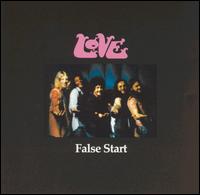Background
The second and final Love album for Blue Thumb Records saw bandleader Arthur Lee heavily influenced by his friend, Jimi Hendrix, with Hendrix appearing on the opening track, "The Everlasting First", one of several tracks that Hendrix recorded with Love during a session at Olympic Studios in London on March 17, 1970. The remaining studio tracks were recorded in June and July of that year at the Record Plant in Los Angeles, while "Stand Out", a song from the band's previous album Out Here (1969), was included on False Start in a live rendition recorded on February 27 at Waltham Forest Tech College in London. [4]
Three selections were later added to the 1988 Love compilation album Out There . In May 2007, False Start was reissued by Hip-O Select as part of The Blue Thumb Recordings.
This page is based on this
Wikipedia article Text is available under the
CC BY-SA 4.0 license; additional terms may apply.
Images, videos and audio are available under their respective licenses.
